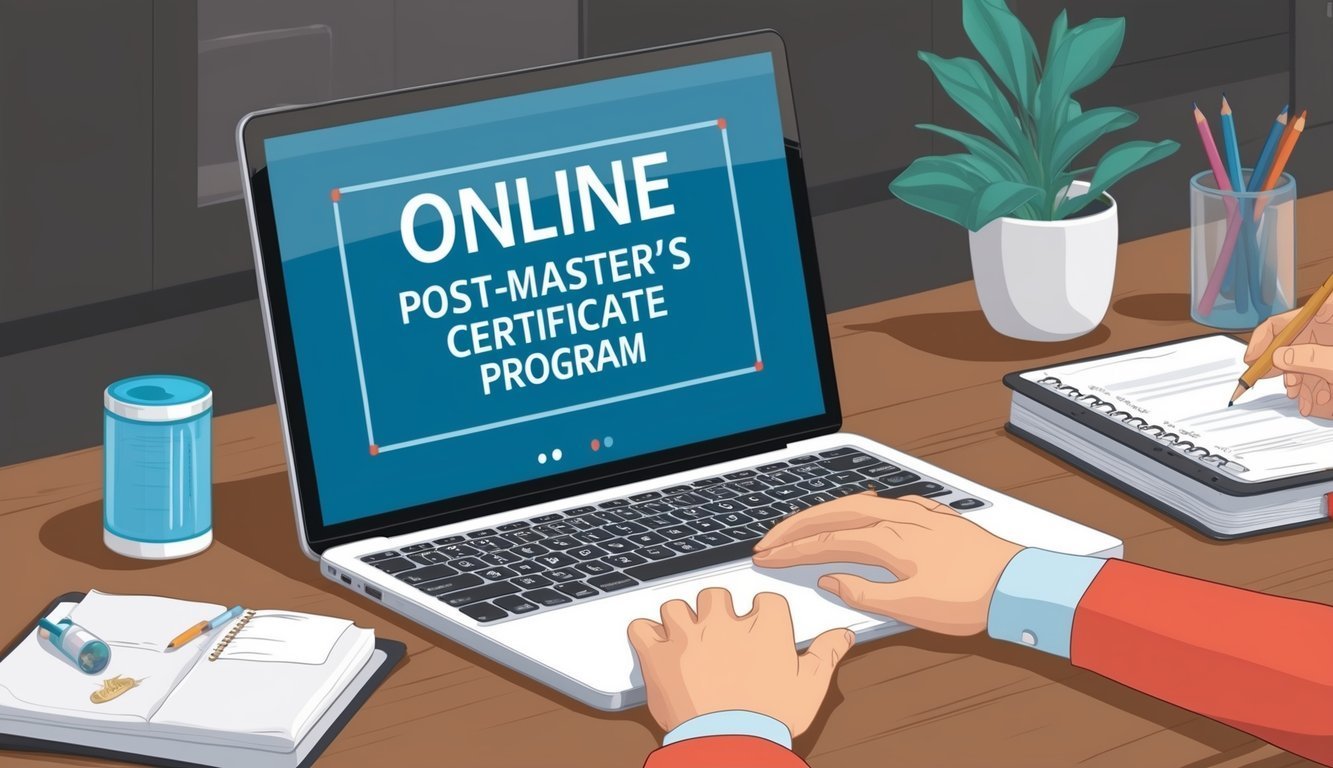As a nursing professional, you may want to enhance your skills and advance your career.
The AGACNP Post-Master’s Certificate Online offers a pathway to specialize in adult gerontology acute care.
This online program is designed for those who already hold a master’s degree in nursing and wish to deepen their expertise in this essential area of healthcare.
Enrollment in an AGACNP program prepares you for various roles in medical settings.
With a mix of online coursework and hands-on clinical experiences, these programs equip you with the skills necessary for competency in high-demand healthcare environments.
You will learn about managing acute conditions while collaborating with interdisciplinary teams, which is crucial for effective patient outcomes.
Advancing your education through a post-master’s certificate not only boosts your resume but also opens doors to new career opportunities.
As healthcare needs evolve, specialized qualifications like the AGACNP become increasingly valuable, ensuring you remain competitive and capable in your field.
Key Takeaways
- The AGACNP program enhances your nursing skills in acute care.
- Online courses offer flexibility while maintaining high educational standards.
- Specialization can lead to new career opportunities in healthcare.
Overview of AGACNP Certification
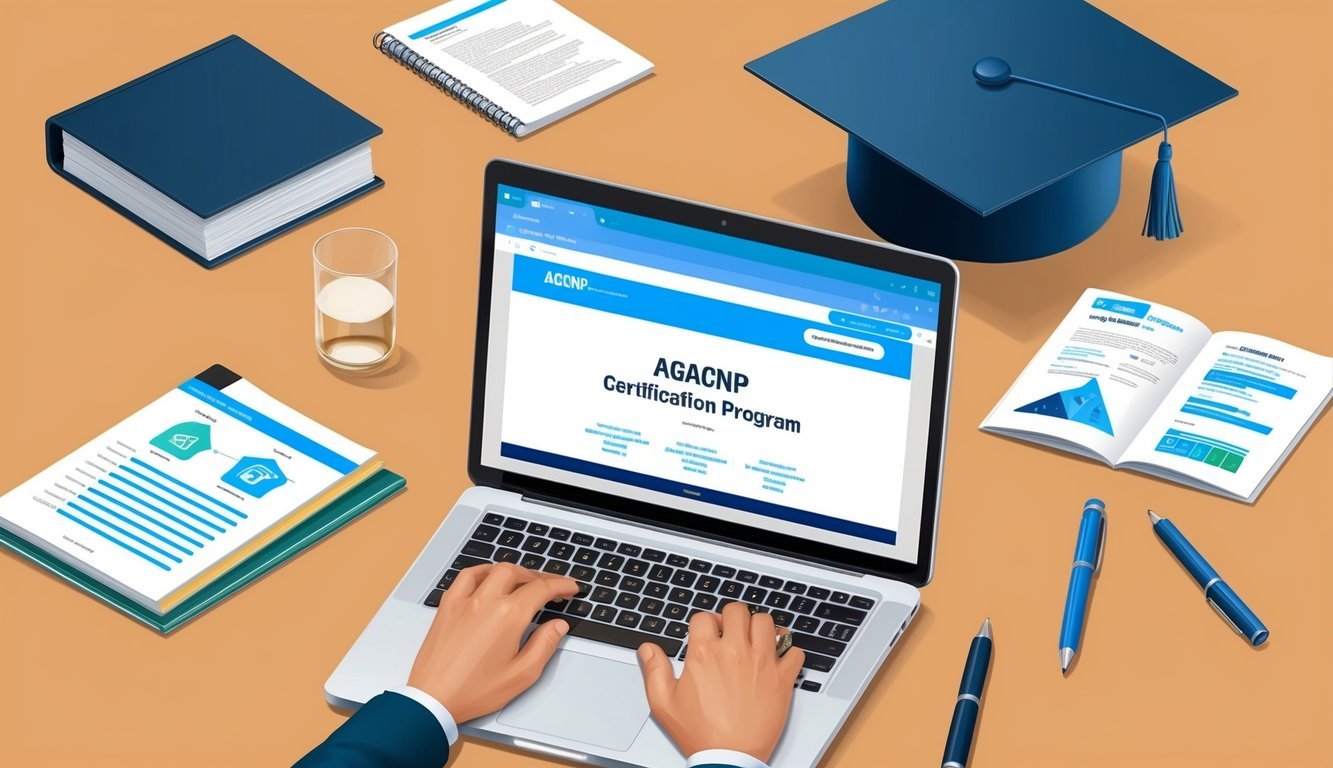
The AGACNP certification is essential for nurses aiming to specialize in adult and gerontology acute care.
This credential not only validates your skills but also opens up various career opportunities.
Understanding its significance and the requirements for achieving this certification can greatly enhance your career in nursing.
Understanding AGACNP
The Adult-Gerontology Acute Care Nurse Practitioner (AGACNP) certification focuses on the advanced practice of nursing for adults and older adults with acute health issues.
You must possess a Master of Science in Nursing (MSN) or a Doctor of Nursing Practice (DNP) before pursuing this certification.
To become certified, you need to pass specific certification exams such as the Adult-Gerontology Acute Care Nurse Practitioner Certification Examination.
These are offered by organizations like the American Nurses Credentialing Center (ANCC) or the American Association of Nurse Practitioners.
Study materials and practice tests are available to help you prepare effectively.
Additional resources can be found at ANCC and AANP.
Importance of Certification
Obtaining AGACNP certification is crucial for your career advancement.
This certification demonstrates your expertise in managing complex, acutely ill patients.
Employers often prefer candidates with this credential, as it indicates a commitment to high-quality patient care.
Having the AGACNP certification can lead to various benefits, including:
- Higher salary potential
- Expanded job opportunities
- Enhanced credibility with patients and peers
Additionally, certification can help you stay current with best practices in nursing education and patient care standards.
It shows that you are committed to ongoing professional development, which is important in the ever-evolving field of healthcare.
Educational Pathway

Pursuing an AGACNP Post Master’s Certificate involves a structured pathway that includes prerequisite education, a focused curriculum, and essential clinical training.
Understanding this pathway is key to advancing your career as a nurse practitioner.
Master of Science in Nursing (MSN) Prerequisites
Before enrolling in a Post-Master’s Certificate program, you must have a Master of Science in Nursing (MSN).
This foundational degree equips you with advanced nursing knowledge and skills.
It’s important that your MSN program covers critical areas such as health assessment, pharmacology, and advanced physiology.
Many programs also require you to hold a valid registered nurse (RN) license.
Some might ask for a minimum GPA or relevant clinical experience.
Completing these prerequisites ensures that you are prepared for the rigor of the certificate courses.
Post-Master’s Certificate Curriculum
The curriculum for the AGACNP Post-Master’s Certificate typically includes courses focused on adult-gerontology acute care.
You will learn to assess, diagnose, and manage patients facing acute health issues.
Courses may cover topics like:
- Advanced Health Assessment
- Pathophysiology
- Pharmacotherapy
In addition, some programs include a clinical component to provide hands-on training.
The curriculum is designed to enhance your clinical expertise and prepare you for certification exams.
Credit Hours and Clinical Training
Most AGACNP Post-Master’s Certificate programs require around 18-21 credit hours of coursework.
You should be prepared for a mix of theoretical classes and practical training.
Clinical training usually consists of 600-800 clinical hours.
This hands-on experience is crucial as it allows you to apply what you’ve learned in real-world settings.
Clinical hours often take place in healthcare facilities and may include simulations to prepare you for patient care.
For a detailed view of specific programs, you can explore options at universities like University of Tulsa and Walden University.
Accreditation and Licensing
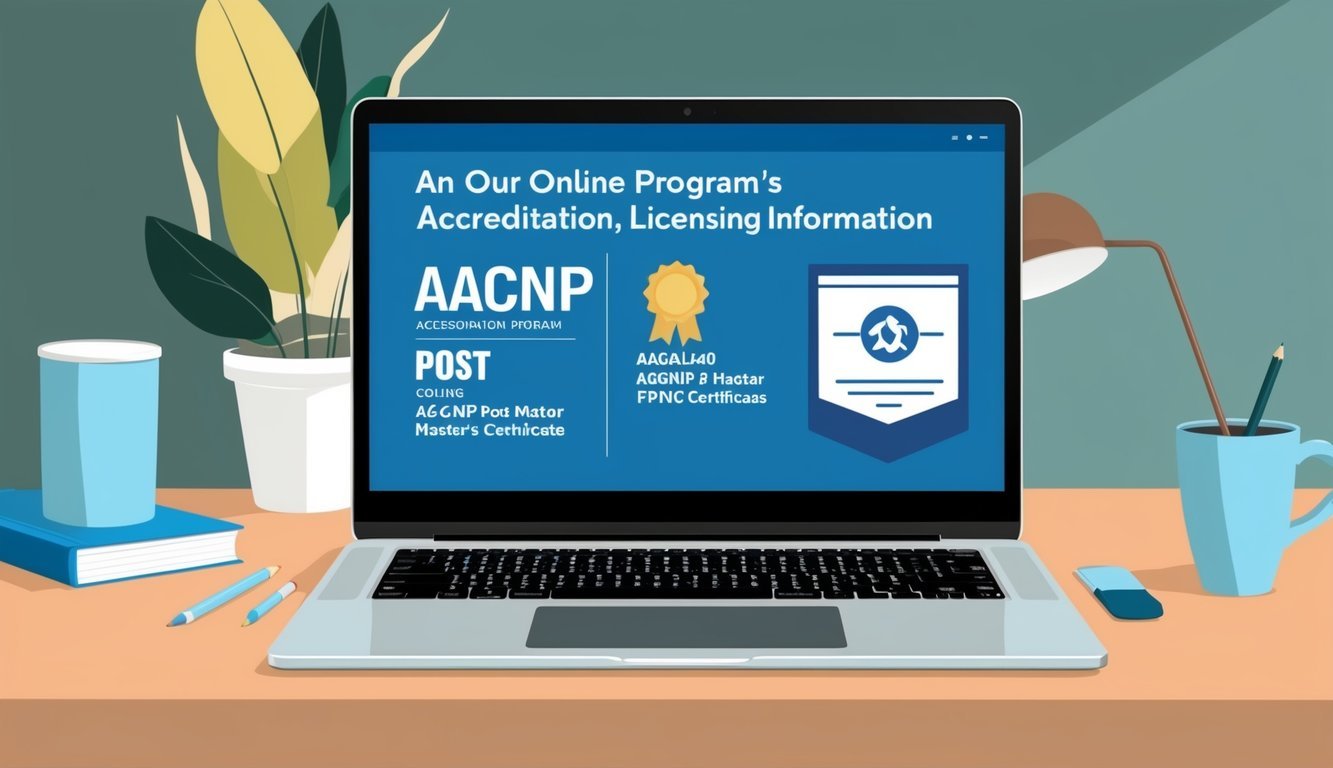
When pursuing an AGACNP Post Master’s Certificate online, understanding the accreditation and licensing processes is crucial.
These components ensure that your program meets established standards and that you can practice safely and legally.
Accreditation Bodies
Accreditation is key to ensuring the quality of your nursing education.
Two primary bodies responsible for this are the Commission on Collegiate Nursing Education (CCNE) and the Higher Learning Commission (HLC).
| Accreditation Body | Purpose |
|---|---|
| CCNE | Evaluates and accredits nursing programs. |
| HLC | Ensures the quality of higher education institutions. |
Programs accredited by these bodies provide a rigorous education that prepares you for clinical practice.
This accreditation can enhance your job prospects and ensure that your education is recognized by employers and state licensing boards.
Licensing Requirements
To practice as an AGACNP, you must hold an active Registered Nurse (RN) license.
This typically involves completing an accredited nursing program and passing the NCLEX-RN exam.
Once licensed, you may also need to meet additional state requirements for AGACNP certification.
Upon completion of your program, you will seek certification through the American Nurses Credentialing Center (ANCC) or another relevant body.
Certification verifies your advanced skills and knowledge to practice in acute care settings.
Check your state’s nursing board for specific licensing requirements, as they can vary.
Criminal Background Check
Most states require a criminal background check as part of the licensing process.
This measure ensures the safety of patients and the integrity of the nursing profession.
You will typically need to submit fingerprints and undergo a background investigation.
Be prepared for this step when applying for licensure or certification.
Failure to disclose past offenses may result in delays or denials in your application.
Confirm the specifics for your state by visiting your local nursing board’s website.
Conducting this check early can help smooth the path to your certification and future employment in the AGACNP role.
Program Details
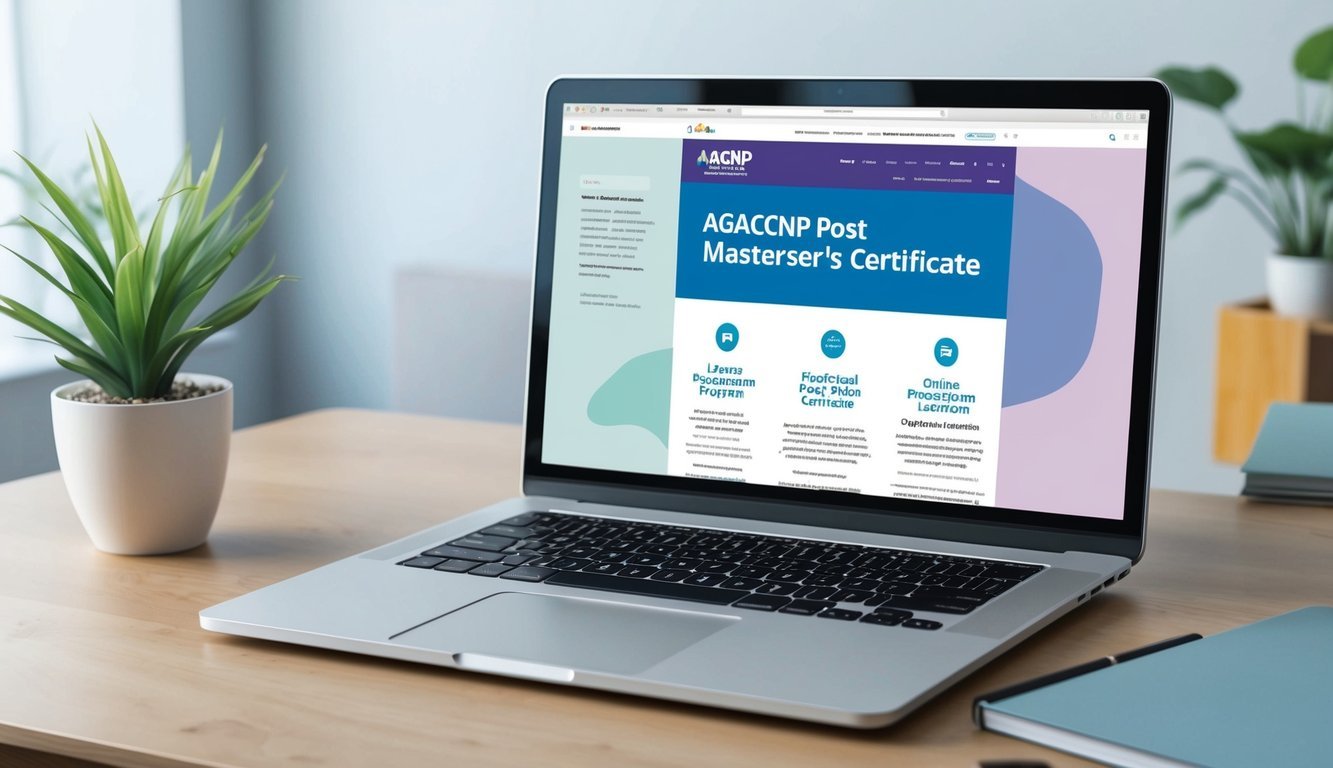
In this section, you will learn about the duration and structure of the AGACNP post-master’s certificate program, tuition and financial aid options, and the application process requirements.
Each of these aspects is crucial for making informed decisions about your educational path.
Duration and Structure
The AGACNP post-master’s certificate program typically requires around 18 to 45 credit hours, depending on the institution.
Most programs can be completed in 1 to 2 years.
The online format allows for flexibility, often letting you choose to study full-time or part-time.
Classes are usually conducted through a mix of online lectures, interactive assignments, and clinical experiences.
Some programs, like those offered by the University of Tulsa and Rockhurst University, include hands-on clinical immersions and simulations, which are essential for gaining practical skills.
Tuition and Financial Aid
Tuition for AGACNP certificate programs varies by school but generally ranges from $10,000 to $30,000 for the entire program.
Always consider additional costs such as:
- Books and materials
- Clinical fees
- Technology fees
Many schools offer financial aid options.
Scholarships and grants may be available to help reduce expenses.
Check with your chosen school for specific financial assistance programs.
Application Process and Requirements
Applying for an AGACNP post-master’s certificate typically involves several steps:
-
Complete an Online Application: Most universities offer this.
-
Provide Transcripts: Submit official transcripts from all previous educational institutions.
-
Letters of Recommendation: Usually, two to three are required from professionals in your field.
-
Personal Statement: Describe your objectives and interest in the program.
Each program may have specific prerequisites, such as a master’s degree in nursing and a valid RN license.
Ensure you check the details for credit transfers as well.
For more information, visit sites like Walden University or Rockhurst University for guidance on the application process.
Career Advancement and Specializations
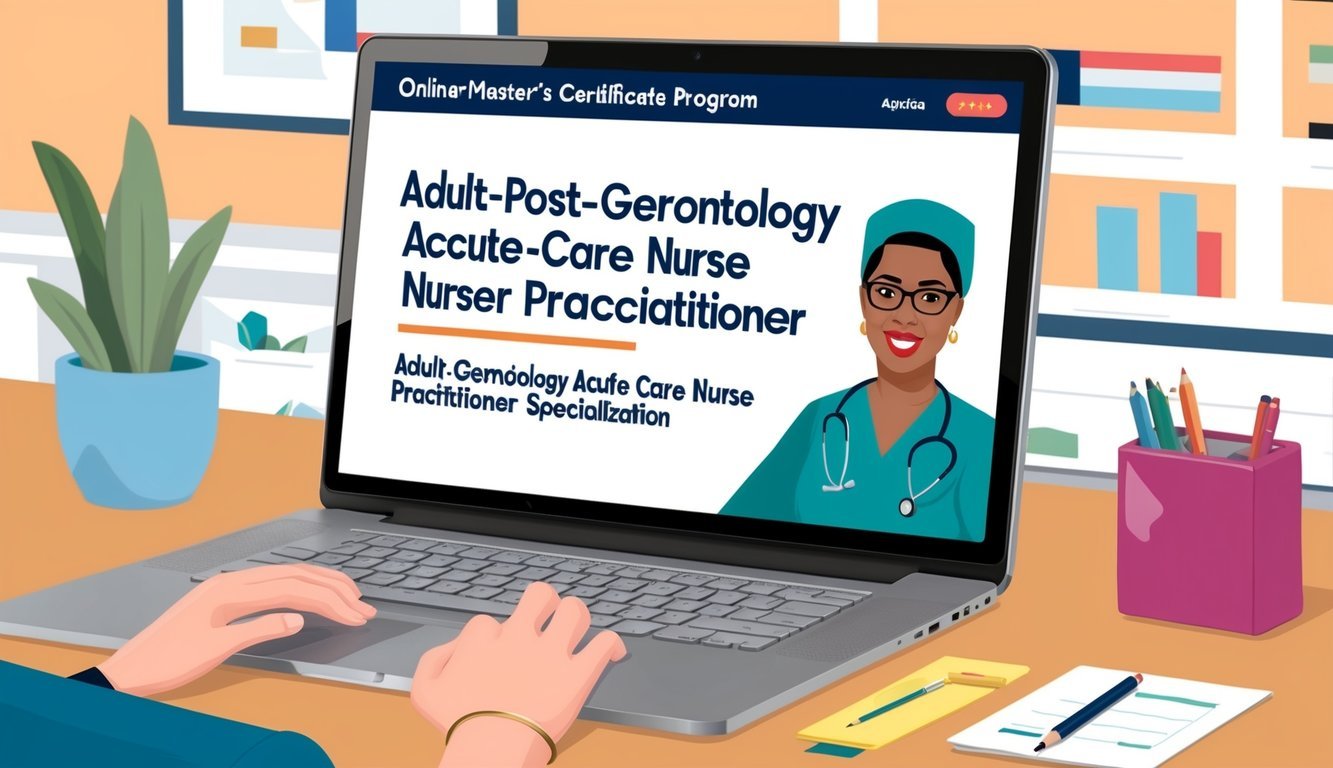
Pursuing an AGACNP Post Master’s Certificate online significantly enhances your career options and provides pathways into various specializations within advanced practice nursing.
You can expect to find opportunities in diverse clinical settings and leadership roles that allow for impactful patient care.
Clinical Practice and Settings
With an AGACNP certification, you can work in a variety of acute care settings.
This includes hospitals, emergency departments, and urgent care facilities.
You will be equipped to manage complex acutely ill patients, bridging the gap between primary and intensive care.
In addition to acute settings, there are opportunities in long-term care facilities where you’ll provide ongoing management for patients with chronic conditions.
This mix ensures that your clinical practice experience is rich and varied, enhancing your skills and boosting your resume.
Leadership Opportunities
Earning an AGACNP certificate positions you well for leadership roles in healthcare.
As a Nurse Leader, you can oversee teams, develop policies, and improve patient care standards.
These roles are critical in today’s healthcare environment, where effective leadership can directly influence patient outcomes.
Moreover, advanced practice registered nurses (APRNs) are increasingly called upon to take on leadership responsibilities.
Your expertise allows you to mentor junior staff and lead quality improvement initiatives within your organization, showcasing your ability to influence change.
Postgraduate APRN Certificate Paths
You can explore various postgraduate pathways after completing your AGACNP certificate.
These programs include specialized training in Family Nurse Practitioner roles, and more focused areas such as critical care.
Each additional certification opens new doors in your nursing career.
Consider programs that offer advanced training in specific areas relevant to your interests.
Areas like psychiatric mental health or gerontology can further diversify your expertise and increase your marketability in a competitive job market.
Additional certifications can lead to roles in specialty clinics or higher managerial positions, making continued education a strategic investment in your future.
Frequently Asked Questions
What are the prerequisites for enrolling in a post-master’s AGACNP certificate program?
To enroll in a post-master’s AGACNP certificate program, you typically need a master’s degree in nursing.
You also should have current registered nurse (RN) licensure.
Some programs may require clinical experience in acute care settings.
How long is the typical duration for completing an online AGACNP post-master’s certificate?
Most online AGACNP post-master’s certificate programs can be completed in about 18 to 24 months.
The specific duration depends on the number of credits required and whether you attend part-time or full-time.
What are the requirements for obtaining certification as an Acute Care Nurse Practitioner after completing a post-master’s certificate?
After completing the post-master’s certificate, you must pass a national certification exam.
Organizations like the American Nurses Credentialing Center (ANCC) and the American Association of Nurse Practitioners (AANP) offer certification for Acute Care Nurse Practitioners.
How can a Family Nurse Practitioner transition to Acute Care NP through an online bridge program?
Family Nurse Practitioners can transition to Acute Care NP through specific online bridge programs designed for this purpose.
These programs typically include additional coursework and clinical hours in acute care settings.
Check with individual schools for available options.
In which ways do AGACNP and AGPCNP post-master’s certifications differ?
AGACNP focuses on adult-gerontology acute care, while AGPCNP (Adult-Gerontology Primary Care Nurse Practitioner) emphasizes primary care.
AGACNPs often work in hospitals and urgent care settings.
In contrast, AGPCNPs typically provide long-term care in outpatient settings.
Are there accredited online post-master’s Acute Care NP programs that offer specialization in areas like pediatrics or gerontology?
Yes, some accredited online programs allow specialization in pediatrics or gerontology.
These specializations prepare you for different patient populations.
They may require additional coursework and clinical experiences.
Be sure to explore various programs to find one that fits your goals.

